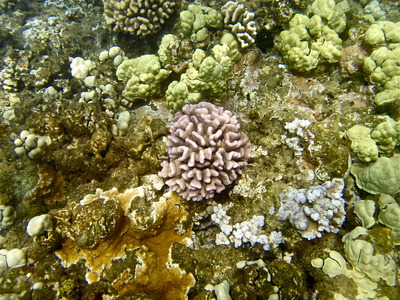Healthy shark populations support healthy reefs
Long-term monitoring of two isolated reef systems off the coast of northwest Australia has found a link between lower shark numbers, due to fishing, and lower numbers of herbivores - important fishes in promoting reef health.
“At first glance the result might seem strange,” says Dr Mark Meekan, Principal Researcher at the Australian Institute of Marine Science (AIMS), who has been involved in the research.

“However, our analysis suggests that where shark numbers are reduced we see a fundamental change in the structure of food chains on reefs. We see increasing numbers of mid-level predators - such as snappers - and a reduction in the numbers of herbivores - such as parrotfishes. The parrotfishes are very important because they eat the algae that would otherwise overwhelm young corals on reefs recovering from natural disturbances.”
The reefs that form the basis of this work are located about 300 kilometres off the coast of northwest Australia, which means the only human impacts they undergo are from fishermen who primarily target sharks.
Because of this remote location, the reefs provide an ideal ecosystem-scale model to assess the impact of overfishing of sharks within the broader context of climate change pressures that threaten coral reefs.
These broader pressures or pulse disturbances include coral bleaching, cyclones, crown-of-thorns outbreaks and coral disease. Such events alter reefs in a ‘bottom up’ manner by causing the death of live corals. Dead corals are then overgrown by algae in most places. This, in turn, changes the composition and complexity of the reef environment, which impacts communities of reef fishes.
Coral can take one to several decades to completely recover from these disturbances, even when severe, as long as they are infrequent.
“With many of the changes from a warming climate already locked in, there may be little we can do to prevent increased frequency of disturbances on coral reefs in the near future,” Meekan said.
However, according to Meekan, this is not the case with the loss of reef sharks. Tracking studies have shown that individual reef sharks are often closely attached to certain coral reefs.
“So even relatively small marine protected areas could be an effective way to protect the top-level predators, which may ultimately mean that coral reefs are better able to recover from coral bleaching or large cyclones,” Meekan added.
“The declines that are occurring in reef shark populations due to overfishing throughout the world are of great concern because our study shows that a healthy reef means healthy populations of sharks.”
The research has been published online in the PLOS ONE journal.
The University of Sydney formalises cervical cancer elimination partnership
The success of a cervical cancer elimination program has led to the signing of a memorandum of...
Noxopharm says paper reveals science behind its immune system platform
Clinical-stage Australian biotech company Noxopharm Limited says a Nature Immunology...
Neurosensing/neurostimulation implants session to be held on Monday
On Monday, a session at UNSW Sydney will include people who are benefiting from bioelectronics...



